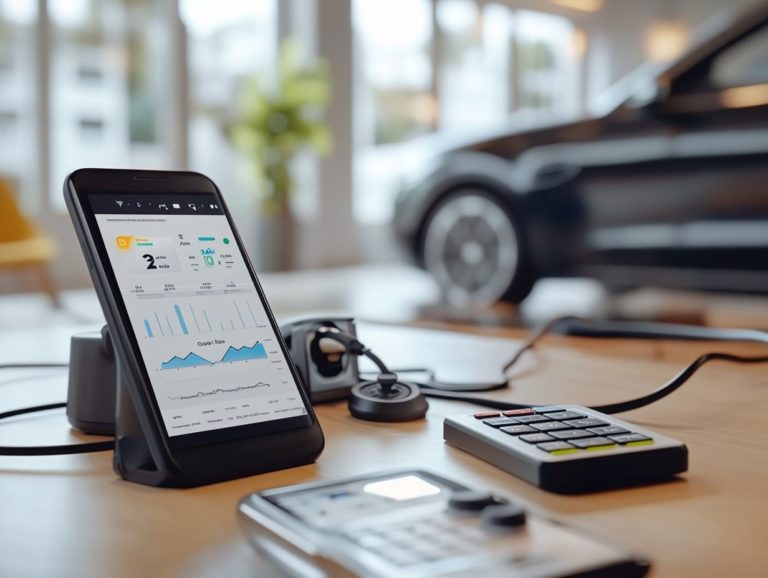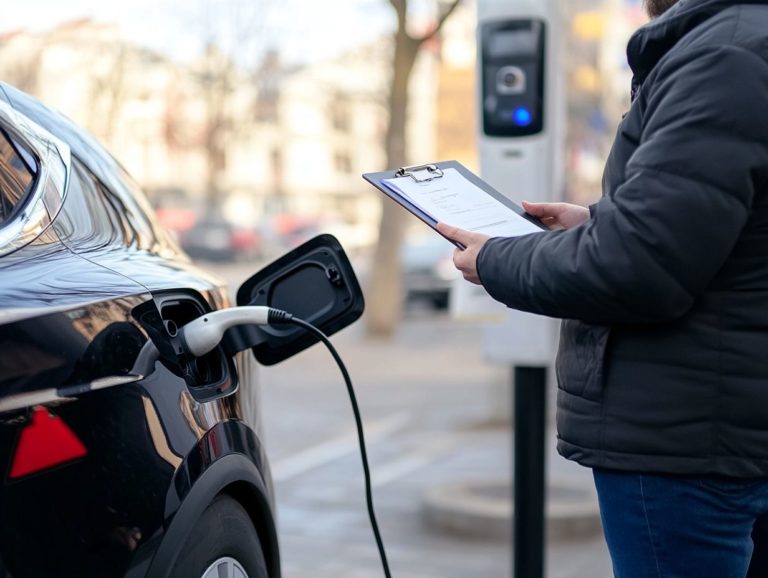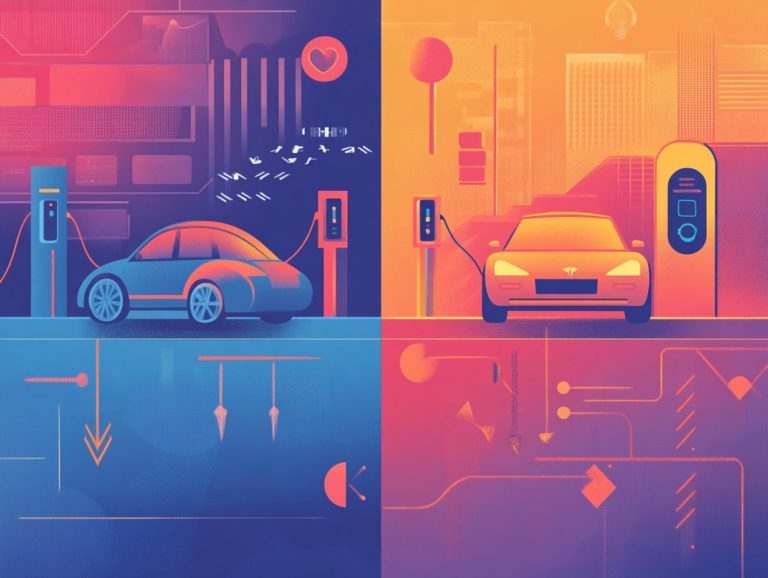can i install a home charging station?
As electric vehicles (EVs) gain traction, you’re likely contemplating the benefits of installing a home charging station.
A home charging station presents an array of advantages, from unmatched convenience to significant cost savings.
Before diving into installation, consider essential factors such as the various types of stations available and the installation process, complete with any associated costs.
You ll also find helpful tips on selecting the ideal station tailored to your specific needs.
Whether you’re a newcomer to the world of EVs or aiming to elevate your home setup, this guide provides everything you need to know.
Contents
- Key Takeaways:
- Benefits of Installing a Home Charging Station
- Factors to Consider Before Installing a Home Charging Station
- Types of Home Charging Stations
- Installation Process for a Home Charging Station
- Costs Associated with Installing a Home Charging Station
- Tips for Choosing the Right Home Charging Station
- Frequently Asked Questions
- 1. Can I install a home charging station for my electric vehicle?
- 2. Do I need any special permits or approvals to install a home charging station?
- 3. How much does it cost to install a home charging station?
- 4. Can I install a home charging station myself?
- 5. Can I use a home charging station for any type of electric vehicle?
- 6. Are there any maintenance or safety precautions I should take with my home charging station?
Key Takeaways:
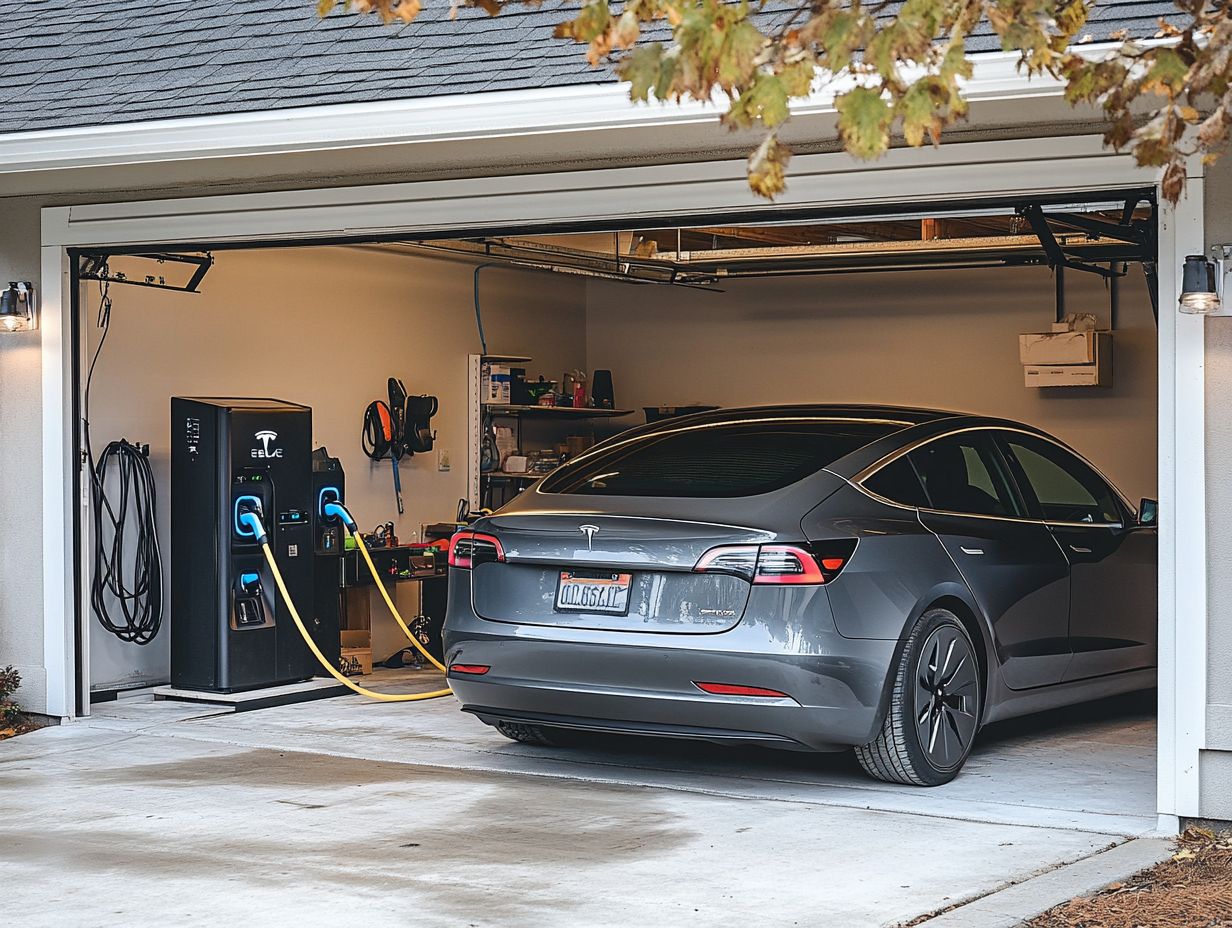
Installing a home charging station offers convenience and cost savings for electric vehicle owners. Before installing, consider electricity costs and your home’s setup to ensure compatibility. It’s also important to know what types of homes are best for EV charging, as there are different types of home charging stations, including Level 1, Level 2, and DC Fast Charging, each with its own benefits and costs.
What is a Home Charging Station?
A home charging station is an essential asset for electric vehicle (EV) owners, offering a dedicated space to charge your electric car conveniently and efficiently.
These stations enable you to charge your EV overnight, eliminating the hassle of frequent stops at public charging stations.
With different charging levels, such as Level 1 and Level 2, a home charging option provides much faster capabilities, drastically reducing the time it takes to replenish your vehicle’s battery.
Compatibility is crucial; various charging stations cater to a wide range of electric car models, ensuring a seamless charging experience.
Charging cables are vital, as they must align with both your car’s specifications and the station’s output.
The rising trend of home installations enhances your convenience as an EV owner and contributes to a broader vision of sustainable transportation solutions.
Benefits of Installing a Home Charging Station
Installing a home charging station presents a host of advantages for electric vehicle (EV) owners, including unmatched convenience, substantial cost savings, and improved performance for your electric car. To learn more about how to charge an electric vehicle at home, consider exploring available resources.
With a dedicated charging option right at home, you can effortlessly charge your vehicle overnight, freeing you from the hassle of stops at public charging stations.
Programs like Charge Ready NY offer incentives for installations, making it a smart and exciting choice for homeowners looking to save money!
Convenience and Cost Savings
One of the primary advantages of installing a home charging station is the remarkable convenience it offers you as an electric vehicle (EV) owner, paired with significant cost savings over time.
By sidestepping the hassle of locating a public charging station, where you might face waiting in line or paying higher fees, you can effortlessly plug in your vehicle at the end of each day.
Home charging provides flexibility in choosing your charging times and allows you to take advantage of lower electricity rates during the night.
For example, charging a standard EV with a Level 2 charger typically takes just a few hours, fully recharging a vehicle like the Chevrolet Bolt in about 7 hours, in contrast to potentially longer waits at public stations. This efficient home setup enhances your daily convenience and significantly contributes to long-term financial savings, making the switch to electric driving all the more enticing.
Factors to Consider Before Installing a Home Charging Station
Before you install a home charging station, it s essential to consider several key factors to ensure seamless installation and optimal performance for your electric vehicle (EV).
Start by evaluating your current home setup and determining if any electrical service upgrades are necessary. It s also wise to understand the electricity costs associated with effectively powering your Level 2 charger.
By assessing these elements in advance, you can select a charging option that aligns with your needs and enhances the advantages of your electric car.
Don’t miss out on the convenience and savings of a home charging station consider installing one today!
Electricity Costs and Home Setup
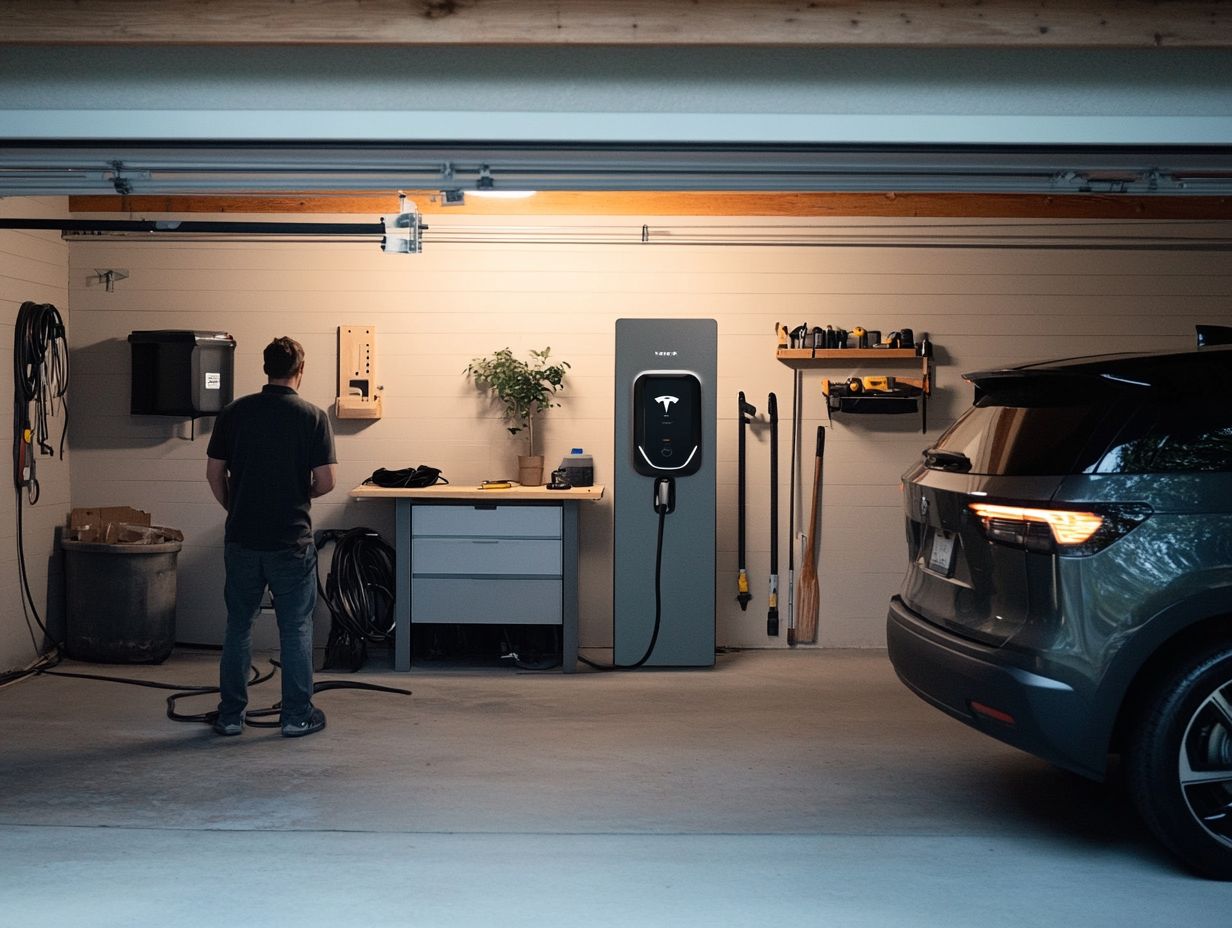
Understanding electricity costs is crucial when installing a home charging station for your electric vehicle (EV). Consider the specifics of your home setup as well.
Look at your energy bill carefully. Break down the charges to find the cost per kilowatt-hour and any peak demand fees that may apply.
This insight will help you understand the financial impact of charging at different times.
Once you know how your bill works, calculate potential savings by looking at various charging times and rates. Make sure your home can support a 240v outlet. Installations can vary based on your electrical panel’s capacity and the distance from the charging station to the main power line.
Don’t forget how your outlets configuration affects performance. Poor installations can lead to energy loss or inefficient charging.
Stay informed! This knowledge will help you enjoy a smooth and affordable EV charging experience.
Types of Home Charging Stations
When considering home charging stations, it’s vital for electric vehicle (EV) owners to grasp the various types available to make an informed choice.
You ll encounter three primary types:
- Level 1 chargers, which operate on standard household outlets;
- Level 2 chargers, which use 240v outlets for quicker charging;
- DC fast chargers, known for their rapid charging capabilities but often requiring more complex installation.
Each type presents distinct advantages and is compatible with different electric car models. It’s essential to evaluate your specific needs and preferences before deciding on a charging solution.
Level 1, Level 2, and DC Fast Charging
Level 1, Level 2, and DC fast charging represent a range of charging solutions tailored for you as an electric vehicle (EV) owner, each offering distinct levels of efficiency and speed.
Level 1 chargers, which use standard 120v outlets, provide the slowest charging times perfect for overnight power-ups.
On the other hand, Level 2 chargers leverage 240v outlets to significantly cut down charging times, making them an excellent choice for home installations.
If you re in a hurry, DC fast chargers are your best bet. They offer the quickest charging speeds but are generally found at public charging stations due to their complexity and cost.
When you think about the overall experience of owning an electric vehicle, the type of charger you choose plays a vital role in fitting your driving habits and lifestyle needs.
Level 1 chargers are great for everyday use but may only replenish your battery sufficiently if you re driving shorter distances.
Meanwhile, Level 2 chargers enhance your home charging experience, allowing you to quickly juice up your vehicle between errands or overnight turning your garage into a convenient energy hub.
DC fast chargers cater specifically to those long road trips, dramatically slashing your wait times at charging stations.
Ultimately, understanding the differences among these charging types enables you to make informed decisions, aligning your charging solutions with your demands for efficiency and flexibility.
Installation Process for a Home Charging Station
The installation process for a home charging station involves several crucial steps and requirements that ensure the safe and efficient charging of your electric vehicle (EV).
It starts with a thorough assessment of your home s electrical infrastructure to identify the best charging solution, like a Level 2 charger.
Engaging a qualified electrician is vital for the installation, as they will guarantee compliance with local codes and optimal performance.
They will also look at any needed electrical service upgrades to accommodate the charging station seamlessly.
Steps and Requirements
The process of installing a home charging station begins with a thorough evaluation of your home’s electrical system and the specific needs of your electric vehicle (EV). This essential first step requires you to assess your home’s existing electrical capacity and infrastructure. If you’re considering expanding to a public charging option, understanding how do I install a public charging station? is also crucial. It’s important to determine the optimal location for the charger; it should be easily accessible while adhering to safety standards.
Next, you’ll want to decide on the type of charger to install typically a Level 2 option for quicker charging. This choice should be informed by your driving habits and the specifications of your EV.
Engaging a licensed electrician will clarify the installation requirements, including any necessary upgrades to your service panel. Be prepared for challenges like inadequate wiring or local permitting issues. By maintaining proactive communication with your electrician, you can uncover solutions that ensure the transition to home charging is smooth and efficient.
Costs Associated with Installing a Home Charging Station
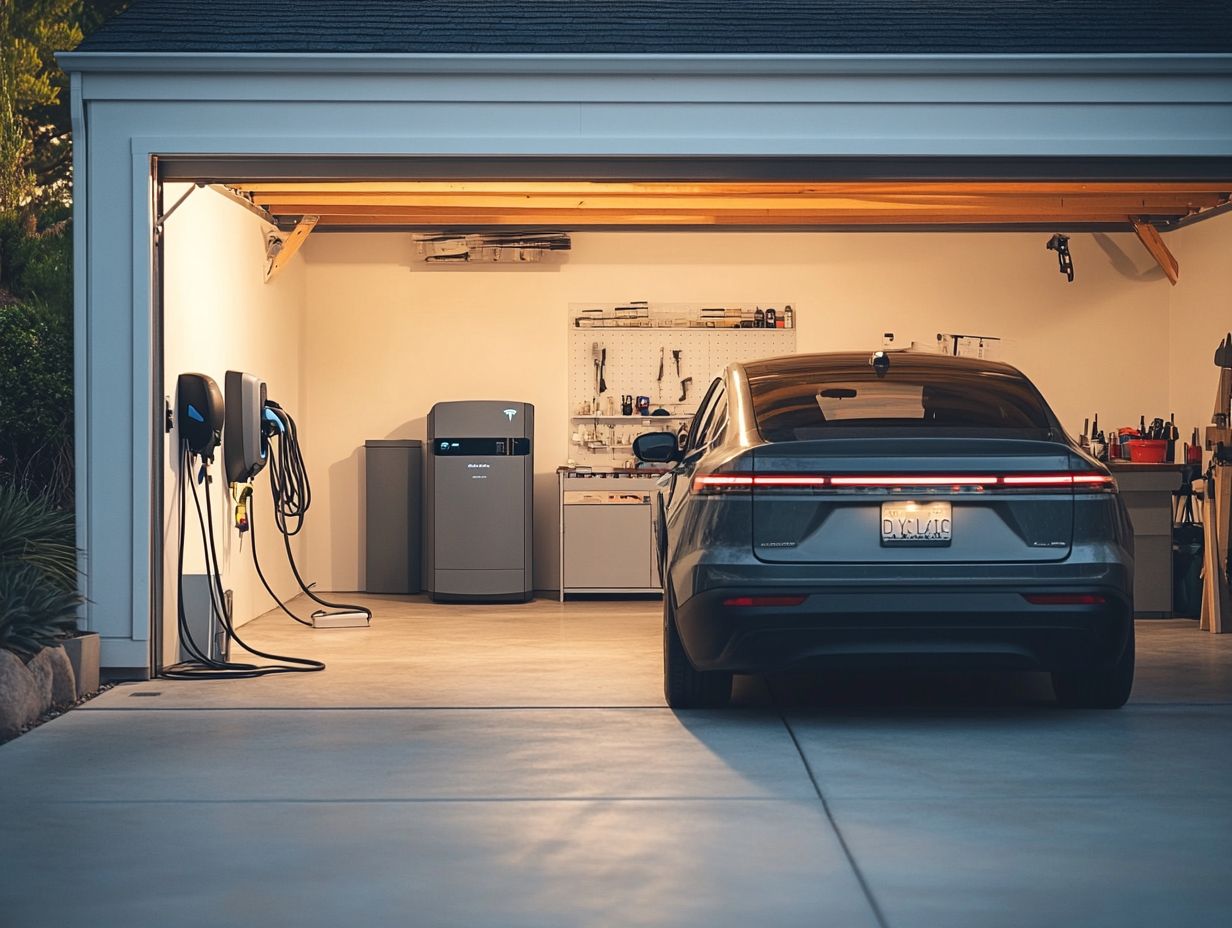
Understanding the costs involved in installing a home charging station is essential for you as an electric vehicle (EV) owner, as it significantly impacts your overall investment in home charging capabilities.
Several factors influence these costs, including the price of Level 2 chargers, installation fees, any necessary electrical service upgrades, and additional materials required to ensure a safe and compliant setup.
By carefully evaluating these expenses, you can make informed financial decisions about your home charging solution.
Equipment and Installation Fees
When you re weighing the costs of a home charging station, it s essential to closely examine both equipment and installation fees. The price of a Level 2 charger can fluctuate dramatically depending on the brand and the features you desire.
Installation fees, on the other hand, typically hinge on the complexity of the task and the rates set by the electrician. Gaining a clear understanding of these costs will enable you to budget effectively and select the ideal charging solution tailored to your needs.
Brand reputation significantly influences equipment prices; established names often come with a higher price tag, reflecting their reliability and robust warranty options. Unique features, such as smart connectivity, adjustable amperage, or advanced safety mechanisms, can also elevate the overall cost.
Installation expenses generally fall between $300 and $1,500, shaped by variables like wiring requirements, the distance to your electrical panel, and any necessary wall modifications.
To ensure you re hiring a qualified professional, consider tapping into recommendations from friends and scouring online reviews. Gathering multiple quotes will not only help you snag a competitive rate but also ensure that your chosen electrician is licensed and insured.
Tips for Choosing the Right Home Charging Station
Selecting the ideal home charging station for your electric vehicle (EV) requires careful consideration of several essential features that will significantly impact your charging experience and efficiency.
You ll want to think about:
- Compatibility with your specific electric car model
- The charging speed that best suits your lifestyle
- Any special features, like smart charging capabilities, that could enhance your setup
By grasping these key elements, you can confidently make a well-informed choice that perfectly aligns with your unique charging needs.
Key Features and Considerations
When evaluating home charging stations, several key features and considerations should guide your decision-making process. This ensures you choose a charger that aligns perfectly with your electric vehicle (EV) lifestyle.
Important aspects include charging speed, compatibility with various electric car models, and extra features like smart charge capabilities, which optimize charging time and energy use.
For instance, the Tesla Wall Connector boasts unique features designed specifically for Tesla owners. Assessing your individual needs is essential. Installation requirements and overall cost are also crucial factors to weigh.
Take the ChargePoint Home Flex, for example. It s a favorite due to its adjustable amperage settings, allowing you to optimize charging based on your home s electrical capacity. Its Wi-Fi connectivity provides real-time monitoring and scheduling, making it an excellent choice for tech enthusiasts.
Since each EV model comes with different charging port types and power requirements, don t forget to check compatibility with your vehicle to avoid future frustrations. By comparing these models, you ll find that some stations excel in user-friendly interfaces and app integration, resulting in a charging experience tailored to various lifestyles.
Frequently Asked Questions
1. Can I install a home charging station for my electric vehicle?
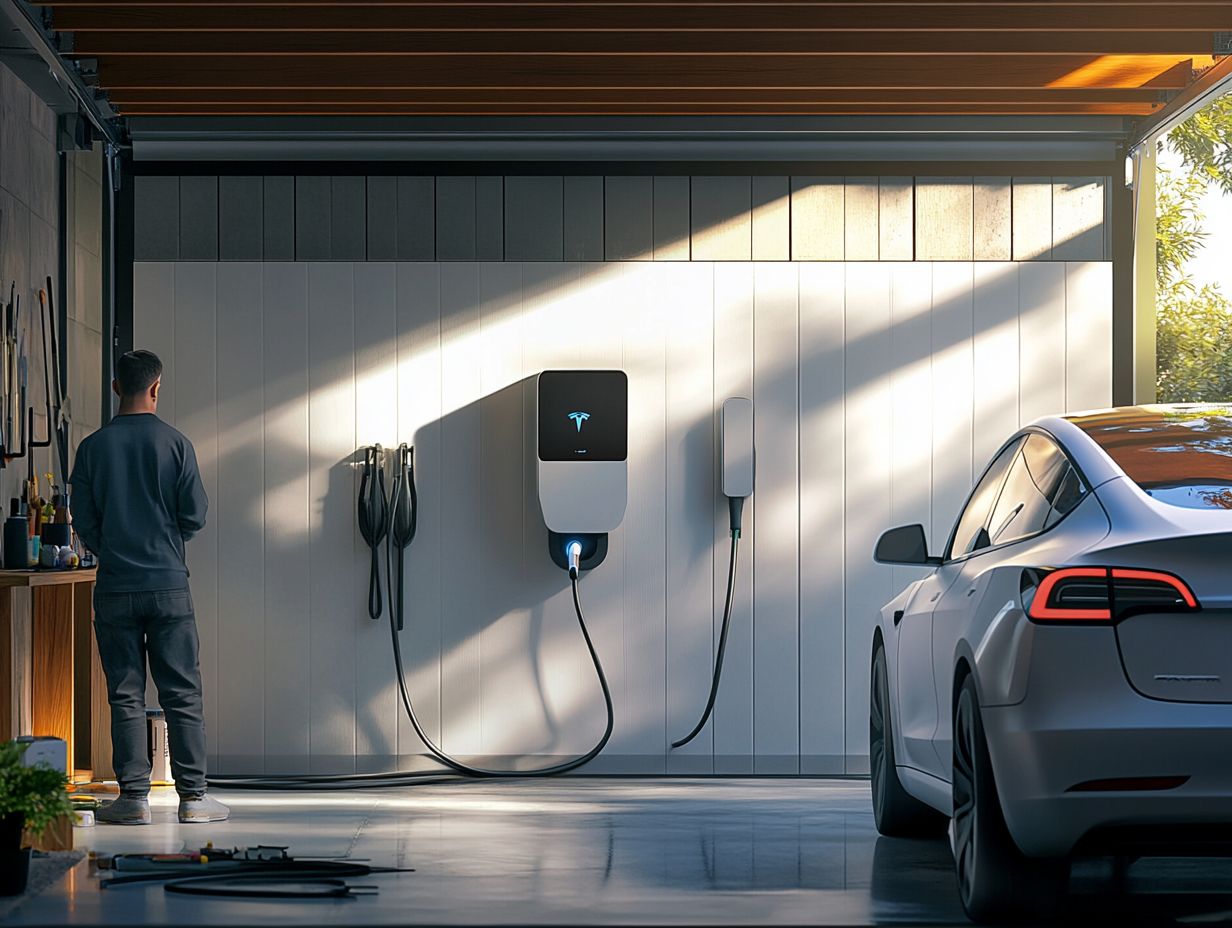
Yes, you can install a home charging station for your electric vehicle as long as you have a designated parking spot with access to electricity. For detailed instructions, check out how to install a home EV charging station.
2. Do I need any special permits or approvals to install a home charging station?
It depends on your location and local government regulations. Some areas may require permits or approvals before installation. Check with your local authorities before proceeding.
3. How much does it cost to install a home charging station?
The cost of installing a home charging station varies based on the type of station, installation complexity, and any additional expenses such as permits. If you’re considering your options, you might wonder, can I use a regular outlet to charge my EV? On average, installation costs can range from $500 to $2,500, depending on various factors.
4. Can I install a home charging station myself?
It is not recommended to install a home charging station yourself unless you have experience in electrical work. Hire a licensed electrician to ensure safety and proper installation.
5. Can I use a home charging station for any type of electric vehicle?
Most home charging stations are compatible with all electric vehicles. However, checking the specifications of your charging station is crucial to ensure compatibility with your specific vehicle model.
6. Are there any maintenance or safety precautions I should take with my home charging station?
You should regularly inspect your home charging station for any damages or wear and tear. It is also recommended to have a licensed electrician perform regular maintenance check-ups to ensure safety and functionality. Follow all safety guidelines outlined in the installation manual.
Ready to install your home charging station? Consult with an electrician today!



